LABScI
Kinematics: The Gravity Lab
Falling objects can be brutal if you don't protect your noodle! Scholars explore the motion of falling objects through measuring short intervals to determine if the distance traveled varies with time. Building off of this, scholars...
Chymist
Build a Spectroscope
Assist your emerging scientists with construction of their very own spectroscopes. Individuals construct a spectroscope to identify elements used in varying lights within a particular environment. They conclude the activity with a...
Curated OER
Tic Tac KNOW: Heat and Light
This is a very developed interactive tic-tac-toe game, with 29 separate game slides. To place a mark on the grid, learners must answer a question correctly. When the grid place is selected the energy, heat and light questions...
Curated OER
Friction 1
In this friction activity, students test heavy and light objects to see if the more friction of the heavier object makes it easy or harder for it to slide. Students also answer 5 questions.
Curated OER
Which One Is Heavier?
For this which one is heavier worksheet, students decide between pictures of two object and click on the one that is heavier, with immediate online feedback, for 52 pairs of objects.
Curated OER
Galileo's Gravity
In this gravity worksheet, students use a ping pong ball, golf ball, tissue, and more to test which falls faster a heavy or light object. Students also answer 5 questions.
Curated OER
Newton's 2nd Law
Fourth graders explore Newton's second law of motion, testing and identifying the characteristics of objects that makes them easier or harder to push. They identify what types of objects are the hardest to move, then test a variety of...
Curated OER
Reflection of Light
Young scholars experiment with reflections of two plane mirrors placed at a 90 degree angle to see what will be reflected.
Curated OER
Heavy Ice: Day Five
Learners explore physics by conducting a class experiment. In this density lesson plan, students examine a list of items and discuss whether they will sink or float and then determine their density. Learners examine the objects over five...
Curated OER
F = ma, Inertia, and Action-Reaction
Fourth graders apply concepts of Newton's Laws in scientific inquiries. Use this lesson to have your charges test and identify the characteristics of objects that make them easier or harder to push. After a teacher-led demonstration,...
Curated OER
Density
Second graders watch a demonstration and complete an experiment to determine how an objects' density allows it to float or sink. They work in small groups to assimilate the characteristics of items that float as opposed to simply...
Curated OER
Why Could the Hindenburg Float?
Tenth graders experiment with floating and sinking objects and heavy and light liquids, using correct terms, like density, to explain what happens. In this Hindenburg lesson, 10th graders watch a demonstration called the invisible...
Hawaiʻi State Department of Education
Push and Pull
I love mixing arts lessons with core content! Here, the class will discuss energy, motion, and force (push/pull) as they review dance vocabulary and movements. They preview vocabulary for force and dance. Then they pair-up to dance a...
Space Awareness
Model of a Black Hole
Even light cannot leave the force of a black hole! Learners use a model to explore the gravitational force of a black hole. An elastic bandage and heavy ball serve to create the hole, while marbles become the victims of its strong force.
Curated OER
Energy At Play
If you can find Tinker Toys™, then this may be a fun assignment for your physical science class. Using the construction set and a few other toys, they examine the forces involved when it they are being played with. For each, they...
Exploratorium
Falling Feather
Whether or not Galileo actually dropped balls from the Leaning Tower of Pisa, this demonstration will solidly demonstrate that objects are accelerated at the same rate, regardless of mass. You will, however, need a vacuum pump and a few...
Curated OER
TRB 3:4 - Investigation 2 - Jump
Third graders jump with and without weights to reveal data that gravity has more of a pulling force with heavy objects that are on the ground than light objects on the ground. They also identify how their legs felt when they jumped with...
Curated OER
Density - An Introduction
Students experiment with objects of different densities. In this density lesson, students examine same-sized objects with different weights, then look at a teacher explanation of density. Students make wave bottles and a density jar to...
Curated OER
Newton's 2nd Law
Fourth graders discuss Newton's Second Law of Motion, and the acceleration of fast and slow moving objects. They experiment with items with different masses to determine the effect mass has on acceleration using a toy car. They complete...
Curated OER
Flick the Switch
After reading a short paragraph on how electrical switches work, learners look at four examples of electrical circuits, and circle the ones which will allow a lightbulb to be lit. This would be a good precursor to having your charges...
Curated OER
Density
Learners find the mass, volume, and density of various objects. In this density measurement lesson plan, students observe how same-sized objects can have different masses, then use water displacement to find the density of each object...
Curated OER
Lesson Plan Seven: Sensorama
Students identify five senses, and use their senses of touch, sight, hearing, smell, and taste to distinguish different objects, sounds, smells and tastes, and write their answers in the booklet.
Curated OER
Crash Test Smarties
Students share hypotheses about the variables needed to produce a collision between two moving objects. They simulate the impact of a moving object on an object that creates a spray of debris, and simulate a NASA Deep Impact study.
Curated OER
It Matters
Learners use descriptive vocabulary to discuss the attributes of matter. Then, they sort objects or pictures by the type of matter they are comprised of. Finally, students match objects of matter with similar attributes and create a...























